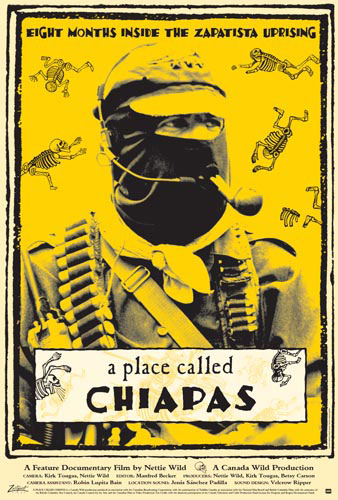A Place Called Chiapas
Nettie Wild
Canadian Nettie Wild is best known for her documentary feature films A RUSTLING OF LEAVES: Inside the Philippine Revolution (1989) and BLOCKADE (1993), both of which have won acclaim at film festivals around the world. Among other honors, A RUSTLING OF LEAVES was awarded The People’s Choice Award at the Berlin FIlm Festival (Forum of New Cinema), the Prix du Public at the National Film Board’s Salute to the Documentary and the Grand Prize at the Houston Film Festival. BLOCKADE shared honors as Most Popular Canadian Feature at the Vancouver International Film Festival, won the Red Ribbon at the American FIlm and Video Festival and the Silver Award at the Houston International Film Festival.
A PLACE CALLED CHIAPAS had its world premiere at the Berlin Film Festival, and permiered at the Sydney Film Festival, Toronto International Film Festival, and won the Audience Award for Best Documentary at the AFI-Los Angeles Film Festival. A PLACE CALLED CHIAPAS also recently won a Genie Award for best Canadian Feature Documentary.
Cinematographer/Producer - Kirk Tougas and Nettie Wild
Producer/Production Manager - Betsy Carson
Editor/ Co-Writer - Manfred Becker
Sound Designer - Velcrow Ripper
Location Sound - Jesús Sánchez Padilla
Camera Assistant - Robin Lupita Bain
Music - Joseph Pepe Danza, Salvador Ferreras, Celso Machado, Laurence Mollerup
a Canada Wild Production produced in association with the Canadian Broadcasting Corporation; with the participation of Telefilm Canada; in association with the National Film Board and British Columbia Film; with the assistance of the British Columbia Arts Council, the Canada Council for the Arts and the Canadian Film or Video Production Tax credit; with the financial participation of Rogers Documentary Fund and the Canada Television and Cable Production Fund License Fee Program.













